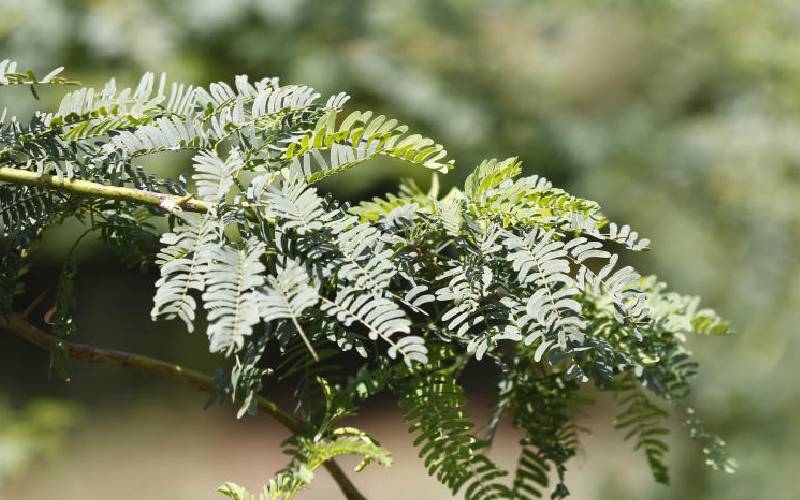
The tree was of interest during World Day to Combat Desertification and Drought.
It is found in up to 20 counties on more than 2 million hectares.
Baringo County has huge chunks of green, inviting vegetation.
Prosopice Juliflora, the green vegetation locally known as Mathenge, has many positives, but what it gives with one hand, it takes with the other. A legume plant, Mathenge was initially introduced to provide fodder for animals besides helping to control soil erosion in Arid and Semi-Arid Lands (ASALs).
The tree provides shade during the day and its seeds are used to make chapati, mandazi and cakes flour, according to Kenya Forestry Research Institute (KEFRI).
But the downside of Mathenge are far-reaching. It has not only taken over food crops and pasture land, but being deeply rooted, Mathenge can easily blocks roads and change flow of rivers that feed into major lakes like Baringo and Bogoria, and thus contributes to conflict, lifetime injuries, and losses.
Mathenge is found in up to 20 counties on more than 2 million hectares.
In Sabalani Sub-location in Baringo South, for instance, where it has spread over hundreds of acres, the tree has ignited competition between man and plant.
Mr Francis ole Kipirich, a farmer and retired senior chief of Salabani in Illchamus Ward says: “My 12 acres have been fully occupied by the invasive plant, denying livestock pasture.”
Mr Simon Choge, Assistant Regional Director at KEFRI, Baringo, says the first tree seedlings of Mathenge were good species, first brought in Kenya and planted by veterinary officers in 1948. “Prosopice Palida did not spread fast,” says Mr Choge. But, he says, things changed in 1975 when another species close to Palida, the Prosopice Juliflora, was brought in. “They resembled, and and anyone could easily confuse the two. It was invasive. It is now giving us problems,” he says.
It was not until the El-Nino rains in 1998 that, Mr Choge says, Mathenge grew much and started competing with man for space and water. “Where this plant grows, it cuts off everything else,” he says.
Mathenge was thus a species of interest during World Day to Combat Desertification and Drought, which was marked on Friday.
The UN says cases of drought have risen to 29 per cent, with an estimated 55 million people directly affected globally every year since 2000.
Some parts of Baringo, for instance, have not received rains for about eight months due to climate change. Farmers can no longer predict rain patterns.
Baringo Governor Mr Stanley Kiptis says: “About 40 per cent of the county is food insecure; 5 per cent is in emergency while 35 per cent is in stress.”
With the sun scorching to above 32°C and falling below 17°C at night, the water tables are slowly getting depleted. “The scarcity of water during drought affects people, livestock and wildlife,” says World Wildlife Fund (WWF).
Mr Yusuf Wato, the Biodiversity, Research, and Innovation Manager at WWF, says: “The situation is worse for water-dependent species such as elephants. An adult elephant drinks 200 litres daily.”
Environment CS Mr Keriako Tobiko said: “Prosopice is no longer just a livelihood issue, it has turned to be a threat to national security.”
Mr Choge says farmers need to be educated on how to thin out huge chunks of the plant, cut them and remove the stems and plant back grass to block its species.
This can be costly, as Mr Kipirich estimates spending more than Sh100,000 to clear the shrubs and trees from his 12-acre farm. But there are other benefits. The seedlings for the grass planted to replace Mathenge go for Sh450 a kilogramme. “Yearly I sell about 300kg of grass and the money pays farm workers, school fees and sustains my family,” says Mr Kipirich.
Mathenge tree is found in Turkana, Tana River, Wajir, Marsabit, Kajiado, Migori, Taita Taveta, Samburu, Kilifi and Isiolo, among others.
Mr Tobiko said the ministry was ready to lift the embargo on the invasive tree provided county governments register a prosopice charcoal producers association and a land ownerss association “who will work with village elders to ensure that when prosopice is removed and burned to charcoal, other trees are not cut down, to avoid soil erosion.”
 The Standard Group Plc is a multi-media organization with investments in media
platforms spanning newspaper print
operations, television, radio broadcasting, digital and online services. The
Standard Group is recognized as a
leading multi-media house in Kenya with a key influence in matters of national
and international interest.
The Standard Group Plc is a multi-media organization with investments in media
platforms spanning newspaper print
operations, television, radio broadcasting, digital and online services. The
Standard Group is recognized as a
leading multi-media house in Kenya with a key influence in matters of national
and international interest.











